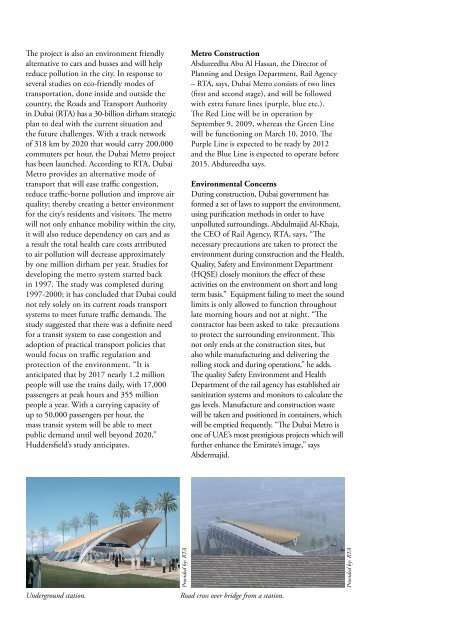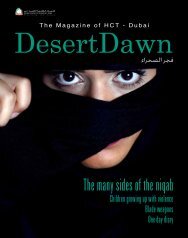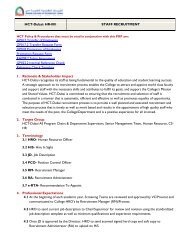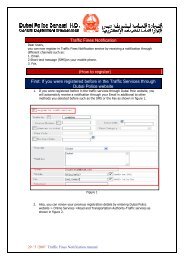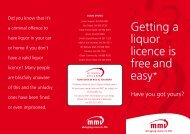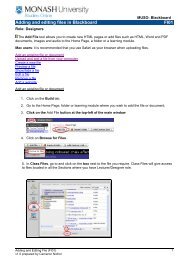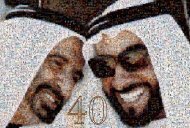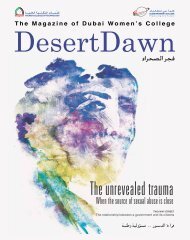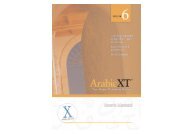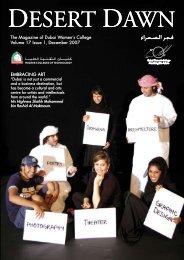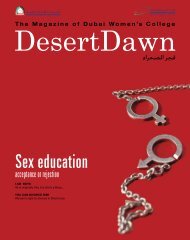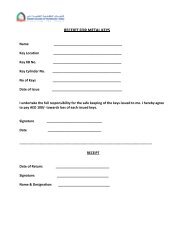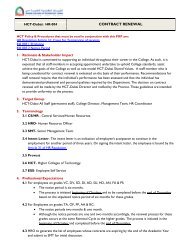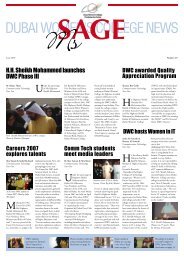The Magazine of Dubai Women's College Volume 16 Issue 2, May ...
The Magazine of Dubai Women's College Volume 16 Issue 2, May ...
The Magazine of Dubai Women's College Volume 16 Issue 2, May ...
You also want an ePaper? Increase the reach of your titles
YUMPU automatically turns print PDFs into web optimized ePapers that Google loves.
<strong>The</strong> project is also an environment friendly<br />
alternative to cars and busses and will help<br />
reduce pollution in the city. In response to<br />
several studies on eco-friendly modes <strong>of</strong><br />
transportation, done inside and outside the<br />
country, the Roads and Transport Authority<br />
in <strong>Dubai</strong> (RTA) has a 30-billion dirham strategic<br />
plan to deal with the current situation and<br />
the future challenges. With a track network<br />
<strong>of</strong> 318 km by 2020 that would carry 200,000<br />
commuters per hour, the <strong>Dubai</strong> Metro project<br />
has been launched. According to RTA, <strong>Dubai</strong><br />
Metro provides an alternative mode <strong>of</strong><br />
transport that will ease traffic congestion,<br />
reduce traffic-borne pollution and improve air<br />
quality; thereby creating a better environment<br />
for the city’s residents and visitors. <strong>The</strong> metro<br />
will not only enhance mobility within the city,<br />
it will also reduce dependency on cars and as<br />
a result the total health care costs attributed<br />
to air pollution will decrease approximately<br />
by one million dirham per year. Studies for<br />
developing the metro system started back<br />
in 1997. <strong>The</strong> study was completed during<br />
1997-2000; it has concluded that <strong>Dubai</strong> could<br />
not rely solely on its current roads transport<br />
systems to meet future traffic demands. <strong>The</strong><br />
study suggested that there was a definite need<br />
for a transit system to ease congestion and<br />
adoption <strong>of</strong> practical transport policies that<br />
would focus on traffic regulation and<br />
protection <strong>of</strong> the environment. “It is<br />
anticipated that by 2017 nearly 1.2 million<br />
people will use the trains daily, with 17,000<br />
passengers at peak hours and 355 million<br />
people a year. With a carrying capacity <strong>of</strong><br />
up to 50,000 passengers per hour, the<br />
mass transit system will be able to meet<br />
public demand until well beyond 2020,”<br />
Huddersfield’s study anticipates.<br />
Metro Construction<br />
Abdureedha Abu Al Hassan, the Director <strong>of</strong><br />
Planning and Design Department, Rail Agency<br />
– RTA, says, <strong>Dubai</strong> Metro consists <strong>of</strong> two lines<br />
(first and second stage), and will be followed<br />
with extra future lines (purple, blue etc.).<br />
<strong>The</strong> Red Line will be in operation by<br />
September 9, 2009, whereas the Green Line<br />
will be functioning on March 10, 2010. <strong>The</strong><br />
Purple Line is expected to be ready by 2012<br />
and the Blue Line is expected to operate before<br />
2015. Abdureedha says.<br />
Environmental Concerns<br />
During construction, <strong>Dubai</strong> government has<br />
formed a set <strong>of</strong> laws to support the environment,<br />
using purification methods in order to have<br />
unpolluted surroundings. Abdulmajid Al-Khaja,<br />
the CEO <strong>of</strong> Rail Agency, RTA, says, “<strong>The</strong><br />
necessary precautions are taken to protect the<br />
environment during construction and the Health,<br />
Quality, Safety and Environment Department<br />
(HQSE) closely monitors the effect <strong>of</strong> these<br />
activities on the environment on short and long<br />
term basis.” Equipment failing to meet the sound<br />
limits is only allowed to function throughout<br />
late morning hours and not at night. “<strong>The</strong><br />
contractor has been asked to take precautions<br />
to protect the surrounding environment. This<br />
not only ends at the construction sites, but<br />
also while manufacturing and delivering the<br />
rolling stock and during operations,” he adds.<br />
<strong>The</strong> quality Safety Environment and Health<br />
Department <strong>of</strong> the rail agency has established air<br />
sanitization systems and monitors to calculate the<br />
gas levels. Manufacture and construction waste<br />
will be taken and positioned in containers, which<br />
will be emptied frequently. “<strong>The</strong> <strong>Dubai</strong> Metro is<br />
one <strong>of</strong> UAE’s most prestigious projects which will<br />
further enhance the Emirate’s image,” says<br />
Abdermajid.<br />
Underground station. Road cross over bridge from a station.<br />
Provided by: RTA<br />
Provided by: RTA


